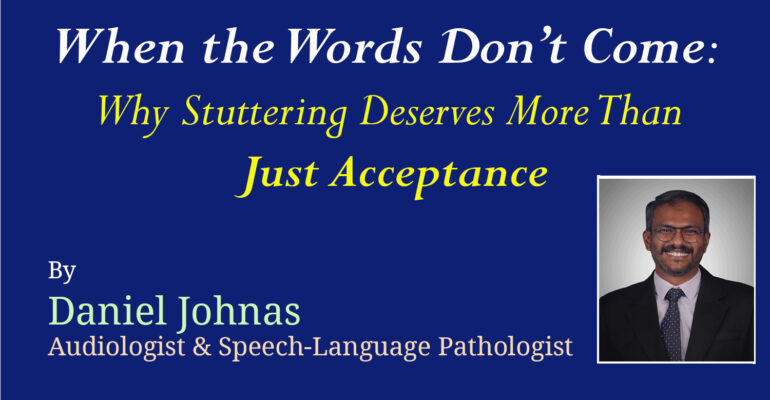When the Words Don’t Come: Why Stuttering Deserves More Than Just Acceptance- By Daniel Johnas, Audiologist & Speech-Language Pathologist
When the Words Don’t Come: Why Stuttering Deserves More Than Just Acceptance- By Daniel Johnas, Audiologist & Speech-Language Pathologist
The first sound I remember is not the crash—but the silence that followed.
Glass hung in the air like tiny diamonds, frozen in the moment. The horn had gone quiet. The world had tipped sideways. My chest throbbed where the seatbelt caught me. My arm wouldn’t move. Blood soaked through my shirt. And somewhere beneath that pain, I heard myself murmur the words, “Call Sefrah… call now…”
My phone had slid into the footwell. I couldn’t reach it.
Aarav, my friend who had been driving, was trembling but otherwise okay. He understood. He grabbed the phone, scrolled to my wife’s name, and pressed “call.”
He looked at me once before the line connected—and I could already see the fear behind his eyes.
Aarav stutters.
Not always. Not casually. But when the pressure builds, when it matters—his voice often doesn’t cooperate. And this time, it mattered more than ever. This wasn’t about a coffee order or a classroom presentation. This was real. I was hurt, and he needed to speak for me.
The call connected. My wife answered.
“Hello? Aarav?”
I watched him try.
“D-D-Daniel… a-acc… ac—” He blocked again. The words wouldn’t come.
She panicked. “Aarav? What’s going on? Speak!”
I saw his hands shake, his brow clench. He pushed through. Slowly, painfully, he managed to communicate enough. Help was on its way. But the look on his face afterwards—humiliation, guilt, helplessness—haunted me long after the sirens faded.
He hadn’t failed me.
But I couldn’t help but feel that someone—or something—had failed him.
—
There’s a rising trend in our field today: the idea that stuttering isn’t a disorder, but a “difference.” A natural variation of brain wiring. Part of the neurodiverse identity spectrum. This view, popularized under the banner of inclusion and self-acceptance, encourages people who stutter to embrace their speech and demand space rather than seek change.
And to a point, I agree.
No one should be mocked or marginalized because of how they speak. People who stutter deserve compassion, patience, and dignity. We must deconstruct the shame historically associated with non-fluent speech.
But we must also ask: what happens when acceptance becomes a ceiling instead of a foundation?
What happens when we start telling people that their struggle isn’t something they’re allowed to overcome—that to want fluency is to betray themselves?
What happens is this: people like Aarav find themselves in situations where the cost of inefficiency is real, and they’re told they should simply accept it.
In trying to make treatment more about what a patient says they want in the moment—and less about what they could become through disciplined effort—we do them a disservice. We may succeed in making them feel accepted, but we also risk letting them miss out on the deeper, richer experiences of life that require communication with precision, courage, and poise.
Therapy is not just about gaining fluency. It’s about becoming fluent in yourself—about shaping the internal scaffolding that supports a meaningful life.
Therapy, done well, draws out within a person three rare and beautiful qualities:
to be methodical,
to be exacting,
to be patient.
These are not simply traits of a good communicator—they are the hallmarks of a grounded soul.
And nowhere is that truth more vividly seen than in the life of Yogita Raghuvanshi.
She wasn’t a therapist. She wasn’t a speaker. She was a housewife.
Her husband, a truck driver, was killed in an accident—leaving behind debt, two children, and silence. She didn’t inherit a fortune. She inherited a steering wheel. And a society that told her: “You don’t belong here.”
But she didn’t wait for acceptance.
She got licensed.
She got behind the wheel.
And she drove.
Across highways crawling with danger.
Across villages that laughed at her.
Across rain-soaked borders and bureaucratic bribes.
Alone. Through deserts. Through nights. Through fear.
She didn’t learn in one go. She failed. She stalled. She wept. She rebuilt the engine of her life bolt by bolt.
And that’s what therapy is.
It’s not always elegant. It’s not always public. It’s often a woman sitting alone in a broken truck in the middle of nowhere, learning how to start again.
Yogita became methodical—checking cargo logs, distances, timings, and vehicle conditions every single day.
She became exacting—not because someone demanded it, but because if she wasn’t, she or someone else might die.
She became patient—not because she had the time, but because without patience, there is no progress.
Today, she’s India’s first recognized female truck driver. But more than that, she became fluent in hardship—and she taught her children to speak the language of courage, not complaint.
This is the kind of growth therapy can unlock—not just in voice, but in vision. Not just fluency, but fortitude.
So no, therapy isn’t about “fixing you.” It’s about furnacing you. It doesn’t ask you to deny your pain. It asks you to master it.
Because the goal isn’t just to speak clearly.
It’s to live clearly.
—
You might be afraid of flying. That’s valid. Flying can be overwhelming. It can feel out of control. So instead, you take a ship. It moves slower. It feels safer. You can breathe.
But what if your child is sick in another country?
What if you have an urgent meeting that could change your life?
What if you only have hours—not days?
That’s when flying matters. And no one is forcing you to love flying. I’m just saying: you deserve to know how to fly when it counts. That’s what therapy is. It’s not a rejection of your identity. It’s a parachute. A tool. A skillset. A choice.
I’m not saying the ship is wrong. I’m just giving you wings—so that when the storms come, you’re not stuck at sea.
—
So no, therapy isn’t oppression. It’s an invitation. A brave one.
And we must stop treating the desire to grow as a betrayal of identity.
We must recognize that while some may have drawn the short end of the stick, they still have the right—and the power—to rise higher than anyone expects.
Let’s stop settling for a narrative that tells people they are enough, but quietly leaves them unequipped. Let’s give them what they deserve:
A chance to grow.
A chance to speak.
A chance to fly.
—
### *References*
* Constantino, C. D. (2023). Exploring neurodiversity and stuttering: Identity, advocacy, and therapy. Journal of Communication Disorders, 105, 106316. [https://doi.org/10.1016/j.jcomdis.2022.106316](https://doi.org/10.1016/j.jcomdis.2022.106316)
* Bothe, A. K., Davidow, J. H., Bramlett, R. E., & Ingham, R. J. (2006). Systematic review of stuttering treatments: Behavioral, cognitive, and related approaches. Journal of Speech, Language, and Hearing Research, 49(5), 948–973. [https://doi.org/10.1044/1092-4388(2006/002)](https://doi.org/10.1044/1092-4388%282006/002%29)
* Craig, A., & Tran, Y. (2014). Long-term psychological and fluency changes following speech restructuring therapy for stuttering. Journal of Speech, Language, and Hearing Research, 57(2), 475–483. [https://doi.org/10.1044/2013\_JSLHR-S-12-0159](https://doi.org/10.1044/2013_JSLHR-S-12-0159)
* Shethia, U., Inamdar, V., & Kulkarni, V. (2025). Evaluating a Digital Speech Therapy App for Stuttering: A Pilot Validation Study. arXiv preprint arXiv:2503.02743. [https://arxiv.org/abs/2503.02743](https://arxiv.org/abs/2503.02743)
About the author:
Helping You Hear, Speak, and Live Better—One Sound at a Time
For over 17 years, Daniel Johnas has helped thousands of people rediscover the joy of hearing and speaking with confidence. As a seasoned Audiologist and Speech Pathologist, he currently serves patients at Bethany Hospital and runs his own clinic—Health Quo—in Hiranandani Estate, Thane West.
What sets him apart?
He’s AUDIO PRO Certified by the American Academy of Audiology—an international mark of excellence
He’s the only certified Neuro-Vestibular Audiologist in Thane, offering specialized care for balance and dizziness-related issues
He sees hearing aids not just as devices for hearing better, but as powerful tools that guide you from alertness to attention to better retention—supporting both communication and cognitive health
As a Speech Pathologist, he works closely with adults recovering from neurogenic language disorders, voice issues, and swallowing challenges, especially in cancer rehabilitation.
Daniel likes to say he’s both your Google Maps through therapy—guiding each turn with clarity—and the cop on the side of the road, making sure you’re staying on track.
Blending medical precision with a heart for people, and fueled by his passion for music and philosophy, Daniel helps individuals not just recover—but reclaim their voice, balance, and presence in the world.
Disclaimer: The views, narratives and practices expressed here are the author’s own. Information provided is for educational purposes only and does not constitute professional medical advice or evidence backed research. Professional training is advised for any further specializations done. Readers should consult with a qualified healthcare professional before making any decisions about their health or treatment.






